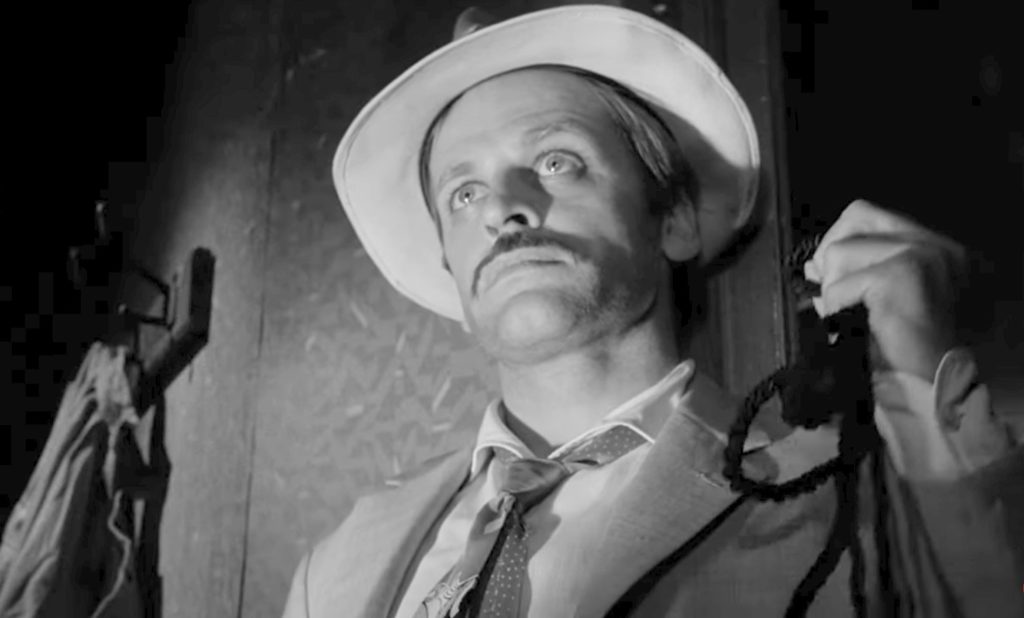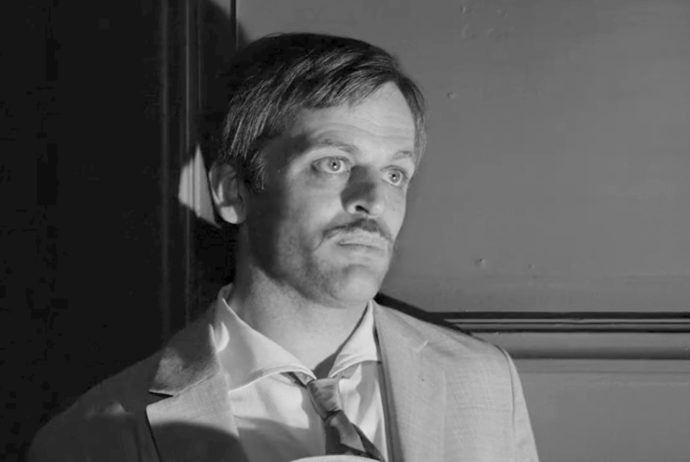Dir: Alfred Vohrer
Star: Joachim Fuchsberger, Brigitte Grothum, Elisabeth Flickenschildt, Klaus Kinski
a.k.a. The Inn on the River
This is reported to be the most successful, commercially, of the 37 Edgar Wallace adaptations released in Germany from 1959 on. Numbers supposedly indicate that over four million tickets were sold during its theatrical run there, beginning in September 1962. This would have made it among the top five biggest local movies of that year. It was also the first in the series to have the famous “Hello, hier spricht Edgar Wallace” voice-over near the beginning, albeit not quite in the smooth way into which the intro would eventually develop. It’s hard to see exactly why this one would achieve such success. It was the twelfth such adaptation, so there wasn’t much novelty to it by that point, and nor is there anything particularly outstanding about the plot, performances or overall execution. Oh, it’s competent enough. There’s just nothing that makes it stand out from the other thirty-six.
Like many, it supposedly takes place in London, mostly on and around the banks of the River Thames. Someone has taken to wielding a spear-gun with extreme menace. They have been named The Shark by police, for their ability to slide away through the water in a wet-suit after committing their crimes, which also include jewel heists. Scotland Yard are largely baffled, and are coming under increasing pressure to solve the case. In charge of the investigation is Inspector Wade (Fuchsberger) of the Greenwich river police, and he focuses his investigation on the dubious riverside bar called the Mekka. It’s run by Nelly Oaks (Flickenschildt), who is well known to have her finger in a variety of criminal pies, such as whisky smuggling. She denies knowing anything, but her teenage foster daughter, Leila Smith (Grothum) provides Wade with valuable information to move his investigation forward.

There are a whole slew of suspicious characters in the mix. These include Captain Brown, who seems to regard Leila as his personal property – this would be rather more creepy, if it wasn’t for the romance between middle-aged Wade and “teenage” Leilia, Quotes used advisedly, since the age gap is not as bad as it seems on-screen. Grothum was actually 27 when this was shot, so less then eight years Fuchsberger’s junior – rather than the half his age she appears to be. There’s also Gregor Gubanow (Kinski), a Russian import-export businessman; Willy, Nelly Oaks’s bouncer, who looks like an accordion-playing version of Ron Swanson; and not even above suspicion as far as I was concerned, was Eddi Arent’s comic relief rower, Barnaby. He harbours dreams of competing in the Oxford/Cambridge boat race, although his actual prowess falls far short of that level.
It’s up to Wade to pick through the various suspects, and figure out their connection to the Seals of Troy, a ship moored on the river not far from the Mekka. As if matters weren’t involved enough, it turns out that Leila’s background might not be as poor and downtrodden as she believes, since she has a scar which matches that of the heiress to a large family fortune. After her birth mother tries to speak to Wade, she becomes the next victim of The Shark. Wade stages a stakeout at the lawyers handling the family fortune, only for not one, or two, but three wet-suit clad individuals to be involved in subsequent proceedings. So, will the real Shark please come forward? Naturally, Wade successfully solves the case, though I’d probably have to watch the movie again, to try and figure out to what extent the resolution makes sense.
It’s the usual mix of elements: not just a whodunnit, but also a whydunnit and perhaps even a whatdunnit. The heiress elements never quite gel with the rest of the proceedings, and I remain unsure as to how Nelly and her accomplices were going to profit from this arrangement. It was clearly some kind of a long game, dating back seventeen years to the end of World War II. There’s quite enough going on in the main plot, to be honest, and it could probably have benefited from some trimming. I’d have been more than happy to see all of Arent’s scenes left on the cutting-room floor. While I usually have quite a high tolerance for his goofy charms, in this case, he simply seem to be trying far too hard, and the results are thoroughly grating, and definitely add nothing of significance. The scene where he’s doing the Twist at the Mekka is simply top-tier cringe.

A couple of things to note about Kinski’s character. The name Gregor Gubanov is a nod to the film’s producer Horst Wendlandt, whose name at birth was Horst Otto Grigori Gubanov. This joke is entirely lost in the English dub, where he is called “Govino” instead. It’s also a rare case where his character sports facial hair. I don’t think I realized how rare this was until seeing it here. Even though we’re only talking little more than a pencil mustache, I’m hard pushed to think of many other cases where Kinski was not entirely clean-shaven on screen. There’s also a twist, only revealed after Gubanov’s death at the hands – or rather, the harpoon – of the Shark: I might call that a spoiler except his fate is revealed in one of the lobby cards (above). It’s then announced he was actually an undercover cop, working for Scotland Yard. Wait, what? Have to say, he was a largely ineffective one, providing little information of use to Wade.
Hamburg and the Elbe stood in for London and the Thames during shooting, and you can occasionally see local landmarks in the background, such as the four smokestacks of the now demolished Tiefstack power plant. But it generally is a reasonably well-assembled piece, with some surprisingly impressive spear-gun moments. As noted already, I’d be hard pushed to identify any factors which led to its unprecedented success at the box-office. Maybe Eddi Arent’s comedic stylings were regarded as riotous entertainment by the locals.
